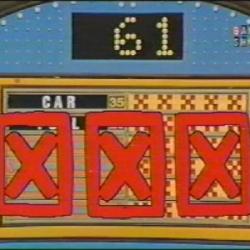The following was originally posted in March of 2005 (using actual scores from actual NCAA tournament games). I’m reposting it today because: A) it’s still true, and B) we’re still having this same argument at the paper and I’m still losing it. And I’m a sore loser.
The sports section is still safe. It is, in some ways, the last bastion of reality-based journalism.
Turn to the sports pages and there you can read the unambiguous results of a sporting event. You will find the final score and statistics for any given contest. Sports writers may inject into their stories a bit of personal opinion and local sympathy, but whatever biases they might have, the facts of the game are never in dispute. A sports writer may detest Bobby Knight and may say so explicitly in his story, but he won’t therefore go on to question whether it is in fact true that Texas Tech has advanced to the Sweet 16 of the men’s NCAA Tournament.
Contrast this with the alleged “hard” news sections of the newspaper. Here the facts are rarely stated as plainly or as confidently as “Texas Tech 71, Gonzaga 69.” Instead, all claims are treated as equally valid by virtue of the fact that someone is claiming them. News reporters consider it their responsibility to quote these claims accurately, not to evaluate them against any notion of knowable reality or anything as seemingly objective as a scoreboard.
Imagine trying to update your brackets for the NCAAs if your only source of information were, say, members of the White House Press Corps: “Texas Tech supporters were claiming victory Sunday after their regional quarterfinal game against Gonzaga. In Spokane, however, proponents of Gonzaga disputed this claim, noting that their team’s point total was equal to that of Kentucky’s and greater than that of Utah’s, and that both of these teams are advancing to the next round.”
It is sometimes said, in rants like this against the plague of he-said/she-said journalism, that news reporters behave like they’re covering a tennis match. But the real problem is that he-said/she-said journalists are nowhere near as responsible as sports writers. Sports reporters, first and foremost, have a duty as indifferent arbiters of the facts. That’s a duty that hard news journalists have long since abandoned.
The paper I work for today is running a Q&A from the Associated Press about “the facts” of the Terry Schiavo case. One of the questions asks if Schiavo is in a persistent vegetative state. The Q&A does not provide an answer — it provides instead two, mutually exclusive answers: Some doctors say she is, but her parents’ doctors say she isn’t. That’s not a Q&A, that’s a Q&Q. “Who are we too say?” is not an answer.
The Schiavo case demonstrates the problem of partisan epistemology. We now have “red facts” and “blue facts.” Newspapers — hoping not to upset either faction of their potential circulation — have no intention in taking sides in such disputes. Thus two competing sets of claims, two very different sets of facts, two opposing narratives, are treated as equally valid. News reporters, unlike sports reporters, feel no responsibility to check the scoreboard, or even to acknowledge that there is a scoreboard. They tend to deny the possibility that a scoreboard might even exist.
In the case of Terry Schiavo there is such a scoreboard, and what it tells us is nowhere near as murky and ambiguous as the AP’s Q&Q or CNN’s vapid, incurious coverage would suggest. The facts of the matter have been hashed out, again and again and again, in court.
Congress and President Bush, like the absurd hypothetical Gonzaga fans above, would prefer that the facts were other than they are. They have, therefore, declared by legislative fiat that the scoreboard be reset to zero and that the game be replayed. Here, however, the sporting analogy breaks down. If the Red Raiders and Bulldogs were to replay their game, the result might be different. But the facts of the Schiavo case will not change, no matter how many times these facts are replayed and reviewed.
Dahlia Lithwick summarizes this congressional battle with the facts of the case in a must-read Slate article:
This congressional authority to simply override years of state court fact-finding brings with it other superpowers …
Members of Congress have apparently also had super-analytical powers conferred upon them, as well. Senate Majority Leader, and heart surgeon, Bill Frist felt confident last week — after reviewing an hour of videotape — in offering a medical diagnosis of Schiavo’s condition, blithely second-guessing the court-appointed neurologists who evaluated her for days and weeks. His colleagues are similarly self-appointed neurological experts. Years of painstaking litigation, assessment, and evaluation by state courts are dismissed by Tom DeLay as the activist doings of a “little judge sitting in a state district court in Florida.” Only the most extraordinary levels of congressional hubris could allow a group of elected citizens to substitute their personal medical, legal and ethical judgments for those of the doctors, judges and guardians who have been intimately involved with this heartbreakingly sad case for years.
The facts of the Schiavo case are indeed “heartbreakingly sad.” But just because they are so deeply sad does not mean we have the power to change them. Congress, with all of its power — even combined with all the power it can usurp from the judicial branch — cannot make this poor woman talk, or wake, or think again.












